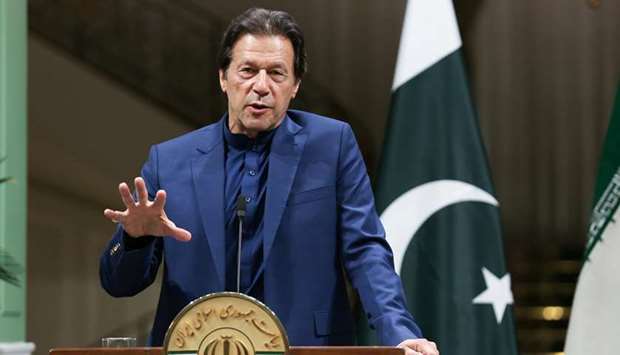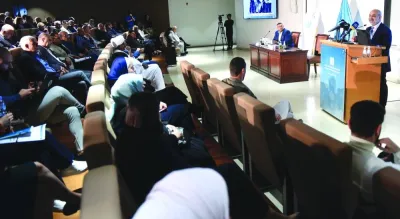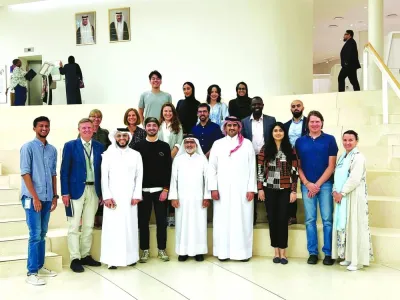Prime Minister Imran Khan says that there has been no confusion in the government’s policy to tackle the challenge of coronavirus pandemic.
Addressing at the National Assembly, he said that the government had immediately enforced a lockdown.
The prime minister said that because of the high-density population and high poverty rate in the country, implementing a complete lockdown for a longer period was not possible.
Hence, Khan explained, the strategy of a “smart” lockdown was adopted to protect people from both the pandemic and hunger.
The prime minister said that the National Co-ordination and Operation Centre (NCOC) was set up to tackle the pandemic effectively in consultation with experts.
He added that the “Corona Relief Tiger Force” has been deployed to convince people to observe standard operating procedures (SOPs) to curb the spread of the coronavirus, which causes the Covid-19 respiratory disease.
The prime minister told the National Assembly that Pakistan’s healthcare system can cope with the challenge of the pandemic if people strictly follow the preventative measures.
He warned that the burden on hospitals will increase if the SOPs are not followed in letter and spirit.
Highlighting his government’s priorities, Khan said that in order to develop agriculture and construction sectors on a priority basis, the government has allocated Rs30bn for a package to provide affordable housing to the people at a low-interest rate.
To revive the industrial sector, he said that duty on thousands of raw materials has been abolished.
Khan said that the government intends to reopen the tourism sector with SOPs in order to protect the livelihood of those associated with the industry.
The prime minister also said that the government has launched the Ehsaas emergency cash aid programme and distributed over Rs140bn among 12mn deserving families in a transparent manner, and plans to expand this programme to 16mn families.
Regarding his vision of a welfare state, Khan said that the government has established 200 panagahs (shelters) in different parts of the country and that the network will be expanded.
He also said that the government believes in equal development of all parts of the country, and that massive allocations have been made in the new budget for the merged districts of Khyber Pakhtunkhwa and Baluchistan.
The prime minister, however, requested that the provinces provide the 3% share of the National Finance Commission Award (NFC) allocations that they had pledged for the erstwhile Federally-Administered Tribal Area (Fata).
Khan said the government has formulated a uniform syllabus to be implemented next March.
On the matter of the locust incursion, he assured that all efforts are being taken to cope with the challenge.
On the issue of politics, Khan categorically stated that he had no personal enmity with members of the opposition, but believes that the rule of law and accountability of the leadership are imperative for progress.
Rejecting the impression of political victimisation, he said that 90% of the cases against the opposition are “old”.
Turning to the recent sugar shortage scandal, the prime minister said that a landmark inquiry was conducted into the matter, which exposed that sugar mills were provided with subsidy of Rs29bn in four years, but they only paid Rs4bn in taxes.
Highlighting his Pakistan Tekreek-e-Insaf (PTI) government’s achievements in foreign policy, Khan said that the issue of Kashmir has been kept on the international stage today.
He said that the whole world is witnessing the alleged persecution of Muslims in India and in Indian-administered Kashmir.
Expressing concern over the situation in Indian-administered Kashmir, the prime minister said that the Kashmiris’ struggle for their right to self-determination cannot be suppressed by deploying 800,000 Indian troops in the territory.
Khan stressed that the Kashmir issue has reached the point of no return after India’s annexation of Kashmir.
On ties with the US, the prime minister said that today Pakistan enjoys cordial relations with Washington.
He reiterated that Pakistan will not be part of any United States war, but will always be ready to facilitate peace talks.
Khan said that the US acknowledges Pakistan’s role in peace process in Afghanistan.
He also said that Pakistan is also trying its best to improve relations between the Saudi Arabia and Iran.
Drawing a comparison between the PTI government’s performance with the previous ones, Khan said that his government inherited a current account deficit of $20bn, which has now been reduced to $3bn, and that borrowing from the State Bank of Pakistan has been brought to zero from Rs6tn.
He further said that tax collection increased by 17%, and that non-tax revenue rose by 33% before the breakout of the coronavirus.
Foreign direct investment, Khan told the National Assembly, rose to $2.1bn from $1bn.

Prime Minister Khan: Pakistan’s healthcare system can cope with the challenge of the pandemic if people strictly follow the preventative measures.


